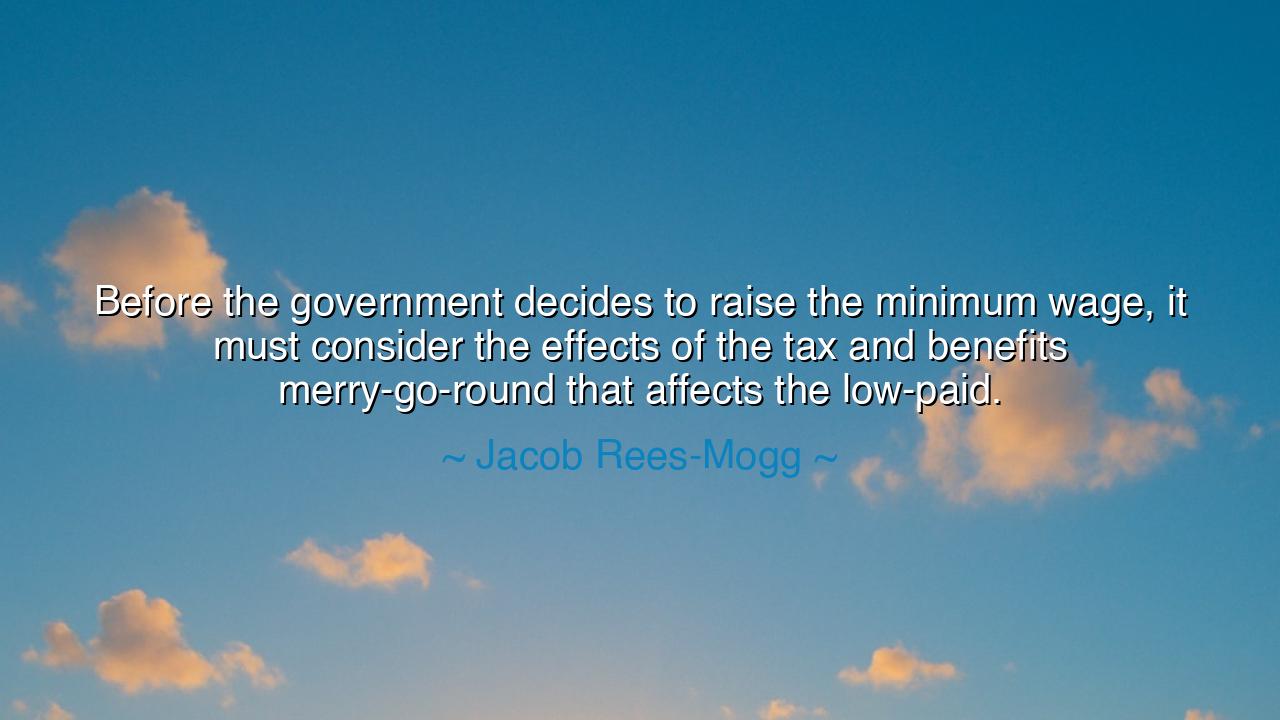
Before the government decides to raise the minimum wage, it must
Before the government decides to raise the minimum wage, it must consider the effects of the tax and benefits merry-go-round that affects the low-paid.






When Jacob Rees-Mogg declared, “Before the government decides to raise the minimum wage, it must consider the effects of the tax and benefits merry-go-round that affects the low-paid,” he was voicing a truth often buried beneath the noise of political simplicity — that every action of government, no matter how noble its intention, carries unseen consequences. His words are not a rejection of compassion, but a plea for wisdom in compassion — for leaders to look beyond appearances and understand the web of cause and effect that binds the economy, the state, and the daily lives of working people. For to act without foresight is to offer comfort with one hand and hardship with the other.
The origin of this quote lies in the British debates over wage policy, taxation, and welfare reform during the early twenty-first century. Rees-Mogg, a Member of Parliament known for his adherence to economic conservatism and classical logic, sought to remind his peers that raising the minimum wage — though well-intentioned — cannot exist in isolation. The “tax and benefits merry-go-round” he spoke of refers to the cycle in which low-income workers, even as their wages rise, lose a portion of their gains through higher taxes or reduced government benefits. Thus, what seems an act of generosity may, in truth, leave the poor no better off, caught in a wheel that turns but never moves forward. His words urge policymakers to see beyond the surface of policy, to balance justice with prudence and sentiment with structure.
In the style of the ancients, we may say that Rees-Mogg’s statement echoes the counsel of the philosopher Aristotle, who taught that virtue lies in the golden mean — the balance between extremes. Generosity without judgment becomes waste; restraint without compassion becomes cruelty. So too in governance: to raise wages without reforming the surrounding system is to pour water into a leaking vessel. The wise ruler, said the ancients, must not only relieve hunger but mend the net that catches the fish. Rees-Mogg’s call for consideration, then, is a call for holistic justice — for a government that understands that kindness without structure may end in futility.
History itself provides a mirror to his warning. Consider the story of Weimar Germany in the early 1920s, when a desperate government sought to ease the suffering of workers through rapid wage increases and social spending. Yet, unchecked by fiscal discipline or awareness of economic interconnection, these measures fed inflation until money lost its meaning. A loaf of bread cost a wheelbarrow of notes; savings evaporated overnight; and despair prepared the way for tyranny. Though Rees-Mogg’s Britain was far from such extremes, the principle endures: that good intentions, if not anchored in economic realism, can destroy the very people they aim to help.
His words also contain a moral wisdom that transcends economics. He reminds us that the relationship between government and citizen is delicate — like the balance of a scale, easily tipped by haste or pride. The low-paid, whom he defends in his remark, are not mere subjects of policy but the living heart of society. They labor, often unseen, sustaining the quiet rhythms of civilization. To raise their welfare is not a question of numbers, but of dignity. Yet dignity cannot thrive in a system where assistance entangles them in bureaucracy, where the state gives with one hand and takes with the other. Rees-Mogg’s insight calls for a form of governance that is both efficient and humane — one that liberates rather than ensnares.
It would be a mistake to hear in his words only the caution of a fiscal conservative. There is, within them, a deeper call to intellectual humility — the recognition that economies are living systems, and that no decree of parliament can alter the laws of cause and effect. Raising the minimum wage may ease suffering for some, but if poorly designed, it can also raise prices, shrink jobs, or penalize those same workers through reduced benefits. Thus, the wise must think not in slogans, but in systems; not in gestures, but in balances. In this way, Rees-Mogg stands among those ancient voices who taught that the art of governance is not to please in the moment, but to preserve in the long run.
The lesson of this quote, therefore, reaches beyond the chambers of government. It teaches that goodness must walk hand in hand with understanding. Whether in leadership, in work, or in life, one must see the full circle of consequences before acting. Let the citizen learn as the statesman must: that mercy without thought may harm, and that wisdom without compassion is empty. Before we demand what is easy, we must discern what is just.
So let these words endure as a timeless admonition: true progress is not made by motion alone, but by direction. To lift the low-paid is a noble goal, but it must be done with eyes open, hands steady, and hearts guided by reason. The government, like the gardener, must tend its soil carefully — pruning, balancing, and nurturing — so that every act of reform becomes not a cycle of dependency, but a harvest of dignity. For when compassion and wisdom join as one, the people prosper not for a season, but for generations to come.






AAdministratorAdministrator
Welcome, honored guests. Please leave a comment, we will respond soon